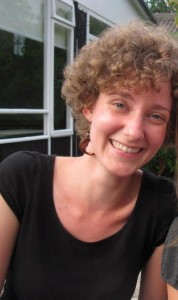This content has been archived. It may no longer be relevant
 NEXT STOP
NEXT STOP
I found the joys of scholarly publishing and science communication: I work at Frontiers’ Editorial Office (scientific open-access publisher) in Lausanne looking after three Field Journals (Frontiers in Microbiology, Frontiers in Ecology and Evolution, and Frontiers in Nutrition), and I am a freelance science writer writing about everything in the realm of Science.
My CV tells me I qualify myself as an evolutionary ecologist. This means I thoroughly enjoy working in the invigorating field of research that integrates the fields of population ecology, life history and trait evolution, thereby recognizing that the critical element of understanding dynamically evolving populations can only be captured by using knowledge on the eco-evolutionary feedback loop. So recognizing that evolution is shaped by ecology, and ecology in its turn is affected by evolutionary dynamics. I am an enthusiastic empirical experimental biologist with a broad range of interests, all within the general theme of the interactions between organisms (ranging from individual to species level) and their environment (biotic and abiotic) and the effect it has on both ecology and evolution.
An aim of my PhD is expanding the knowledge on the usability of resurrection ecology for decomposing a population’s demographic and phenotypic dynamics into its major contributors (ecological and evolutionary processes) and their relative contributions. Having worked on different systems in both ecology and evolution, I am now for the first time in my life using an aquatic model organism: the rotifer Brachionus calyciflorus. I will design experiments making use of its fascinating lifecycle and life history to both test and contribute to the formulation of new theory on the feedback loop of evolutionary and ecological dynamics using a trait based demographic approach. This PhD will therefore hopefully shed light on the relative importance of the evolution-to-ecology and ecology-to-evolution pathways, and aid in understanding the role of environmental change in determining population fluctuations.
By literally bringing the past back to life, the tool of resurrection ecology can be used in a wide variety of research topics. It is for example possible to study the implications of microevolutionary change in the recent past, the evolution of phenotypic plasticity, the evolutionary response to climate change, etc.
CV
2013-2014 PhD student, Institute of Evolutionary Biology and Environmental Studies,
University of Zurich, Switzerland
2012-2013 Teaching Assistant, University of Amsterdam, The Netherlands
2009-2012 MSc in Biological Sciences, track Ecology & Evolution, University of Amsterdam, The Netherlands. Projects at the Netherlands Institute of Ecology, Imperial College London, and the University of Oxford
2006-2009 BSc in Biology (Ecology & Biodiversity), University of Amsterdam, The Netherlands
